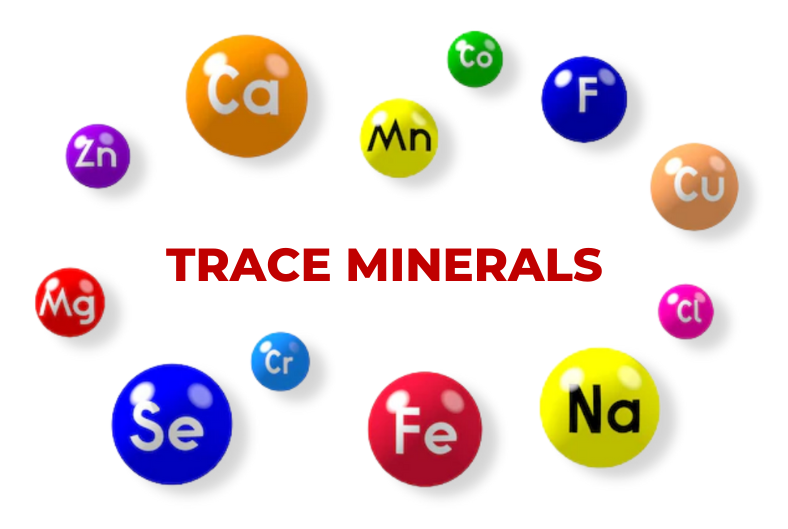Minerals called trace elements or trace metals are minor levels that are found in living tissues. Some of them are viewed as nonessential, some are only hypothetical or lacking in proof, and some are acknowledged to be nutritionally essential.
If ingested for long enough at high enough amounts, all trace elements are poisonous. For some critical trace elements, the difference between hazardous intakes and optimal intakes that satisfy physiological needs is significant, but it is much lower for other elements.
The list of the most significant trace elements is as follows:
Iron
In order for proteins and enzymes to function, iron is required. It is essential for the development of lean muscle and red blood cells. Worldwide, those who regularly engage in severe physical activity, children, women of childbearing age, pregnant women, and people with parasites, gastroenteritis, and other medical disorders are at risk for iron deficiency. Iron deficiencies may also result from strict vegetarian diets. Red meat, chicken, shellfish, and dark leafy vegetables all contain iron.
Chromium
Chromium aids in the metabolism of glucose and the actions of insulin. Lack of chromium can cause symptoms that resemble diabetes, reduced glucose tolerance, and an increased requirement for insulin. Typically, yournutritional needs for chromium should be readily met by a well-balanced diet that includes fruit, vegetables, meat, fish, and grains.
Copper
The creation of energy, iron metabolism, healthy connective tissue, neurotransmission, and hemoglobin synthesis are just a few of the vital processes copper plays a part. Malnutrition, poor absorption, or a high zinc intake can all cause copper deficits. Abnormal blood cells, alterations in bone and connective tissue, a weakened immune system, demineralization of the bone, and a higher risk of cardiovascular and neurological disorders are a few symptoms that may be present.
Zinc
Children’s healthy growth and development, the immune system’s appropriate operation, several neurological processes, and reproduction all require zinc. A diet deficient in zinc may harm up to two billion people in underdeveloped nations. It may result in a reduced immunological response, anemia, skin rashes, neurologic abnormalities, and poor development. Oysters, beef, crab meat, dark-meat chicken and turkey, pig, yogurt, milk, cashews, chickpeas, almonds, peanuts, and cheese are among the foods high in zinc.
Iodine
A well-known essential ingredient of the thyroid hormone is iodine. Lack of iodine in food and drink can cause mental drowsiness, weight gain, altered lipid profiles, and reduced metabolism. Iodine shortage can harm a child’s developing brain and result in mental retardation and other problems.
Manganese
Several enzymes that have antioxidant advantages for a variety of metabolic processes, assist bone growth, and promote wound healing contain manganese as a component or a facilitator. Weaker bones have been associated with low manganese levels.
Selenium
The amino acid selenocysteine, which is found in 25 distinct selenoproteins, contains selenium. Selenoproteins are essential for DNA synthesis, thyroid hormone metabolism, reproduction, and defense against infection and oxidative stress.
So are trace minerals needed in that amount? Fortunately, it’s not necessary to hazard a guess as to how much of a particular trace mineral your body requires each day. For a comprehensive list of nutrients, all you have to do is look at the Recommended Daily Intake (RDI, for short), issued by the National Institutes of Health.
How come you may not be getting enough trace minerals?
You could not be getting all the trace elements your body requires for a number of reasons, including a bad diet Lack of a well-balanced diet is the main cause of possible trace mineral deficiencies.
Malabsorption and gastrointestinal conditions: If the gastrointestinal tract is inflamed, diseased, or affected by a condition that impairs the absorption of minerals and other nutrients, this will undoubtedly result in decreased absorption and excessive mineral loss. Surgery: Surgical excision of intestinal segments may result in the loss of critical carrier channel sites and uptake sites for mineral absorption. Deficits in trace minerals typically happen during pregnancy.
A word from the doctor –
Despite the fact that a balanced diet often supplies the body with enough trace minerals, it is important to note that strict vegetarian diets, intense activity, pregnancy, gastrointestinal disorders, and malabsorption problems can all cause trace mineral shortages.
So, get started by contacting us right away!

